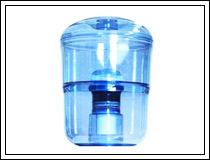POU Treatment
POU Treatment or Point-of-Use water treatment does not refer to a single water treatment method, but a large variety of water treatment or water quality correction methods that are used to improve or alter the quality of drinking or cooking water. Such water treatment strategies are mostly adopted in improving drinking/cooking water quality at a more decentralized scale (not involving a distribution network), like in rural areas and small communities or at the household level.
Thus, unlike a central treatment plant or distribution system that treats all the water distributed to consumers, a POU treatment device such as a faucet-mounted filter, water filter, on counter unit, or an under counter unit treats only a portion of the total flow, i.e., such devices typically installed at a single tap, outlet or faucet treat water intended for potable and selective use at home or business. In brief, POU water treatment systems remove contaminants and treat water at a point of use rather than at its source.

POU Treatment Methods Used
As mentioned before, POU water treatment is not a defined water correction technique like reverse osmosis or filtration, but an assorted selection of various purification processes. Generally one or a combination of the following water treatment methods are employed in POU water treatment:
- Boiling
- Ceramic pot filtration
- Chlorination
- Cloth filtration
- Sand Filtration
- Coagulation (natural or chemical)
- Pasteurization
- Solar disinfection (SODIS), etc.
Advantages of POU Treatment
- POU water treatment is a fast and simple method of purifying contaminated water in cities, villages, farmsteads and other outlying communities.
- Any form of chemical, physical, or biological contaminants can be eliminated with the help of POU water treatment systems.
- POU treatment methods can be selectively designed to exclude water used for other purposes such as irrigation of outdoor spaces, gardens and lawns.
- As compared to centralized treatments, POU treatments are highly affordable and cost effective, though they give more or less the same level of protection to the consumer.
- POU treatments are easily scalable, i.e., they can be upgraded to cope up with increased level of performance or suit larger operational demands.
 |
Boiling
Since ancient times, it has been know that water is directly linked to our health. Hence, various ways of water disinfection has been applied for centuries.
|
|
 |
Ceramic Pot Filtration
A ceramic pot filter is a simple, small yet extremely effective drinking water filter commonly used by hikers, outdoorsmen and sports enthusiasts.
|
|
 |
Chlorination
Chlorination, as the name suggests is one of the most common and basic methods of treating contaminated water by using chlorine.
|
|
 |
Cloth Filtration
Water is that indispensable factor of life without which no living being can survive. The rapid rate of industrialization in modern age and our ignorance to a certain extent has led to the contamination
|
|
 |
Natural or Chemical Coagulation
Coagulation refers to a process of treating contaminated water. It involves the addition of chemicals or natural products to water.
|
|
 |
Pasteurization
Pasteurization refers to the process of heating liquid edible or drinking water to a specific temperature for a definite length of time and then cooling it immediately to disinfect it from microbes.
|
|
 |
Sand Filtration
Sand filtration is a very basic and cost effective method of treating contaminated water. Sand filtration utilizes the filtering properties of sand and produces clean water that is perfectly safe for consumption.
|
|
 |
Solar Disinfection (SODIS)
Popularly abbreviated as SODIS, solar water disinfection is a simple, safe, economical and effective method of disinfecting contaminated water.
|
|
|
|